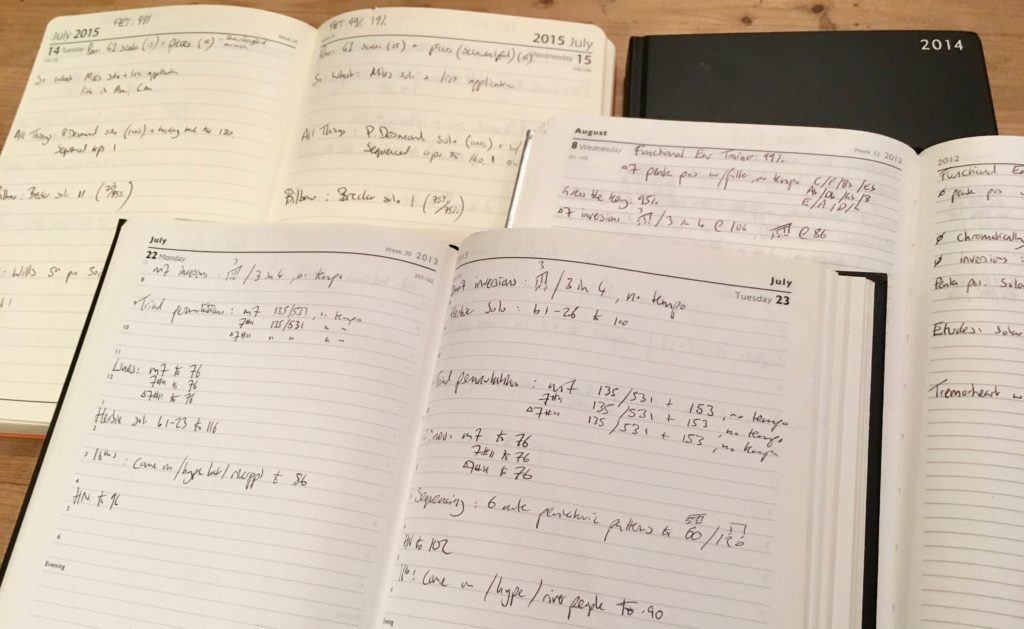How To Practise, Part 3: Keeping Track
In a drawer under my bed I have a collection of old diaries stretching back to 2008, detailing almost every day of the last decade. Here are a few of them:

These are not diaries in the conventional sense – they don’t contain my musings on life’s trials and tribulations, there are no empowering affirmations or overly confessional spoken word poetry. Instead, there are scribblings – hieroglyphics listing exercises, keys, metronome markings and time logged at the instrument, part of the never-ending process of attempting to achieve musical mastery.
So why would anybody want to engage in such a boring, borderline-OCD activity?
Tracking your music practice has numerous benefits:
1. Keeping Track Keeps You On Track
Maintaining a log of what you practise, how often you do it and how much time you get at the instrument is a great way of providing yourself with accountability (this was also emphasised in the last post on finding a teacher). Nothing motivates me more than opening my practice diary and being embarrassed by the long gaps between practice sessions – I can see when I’ve been slacking off, or letting life get in the way of spending time at the bass. Seeing the fine details of your practice (or lack thereof) in black and white reinforces the message that you alone are responsible for your musical development – even if you’re taking regular lessons, your teacher cannot do the work for you; if you want to improve then you have to put the hours in.
2. Tracking Provides Accurate Feedback
What were you practising 6 weeks ago today? What were you working on? What keys did you play in? How fast were you playing? How much have you improved since then?
If you rely solely on your memory for these items of information then you’re not only burdening yourself with lots of extra figures to carry around in your brain but you’re also likely to forget many of the details, especially if you’re practising regularly. There’s a Chinese proverb that goes something like this:
“Even the palest ink is better than the strongest memory”.
I find having an accurate written record of the minutiae of my practice routine helpful in gauging my musical progress, not least because my short term memory is terrible – in fact, the act of ‘going back in time’ in my practice diary by 6 months or so is a useful way to remind myself of all the things that I should be able to play but have probably forgotten.
Tools and Tactics
I have two ways of tracking what happens on a day-to-day level – one physical, one digital:
1. The Practice Diary
As detailed above, this acts as a detailed written record of what I’ve been working towards on a given day – my preference is for an A5 notebook, but if you’re clocking up lots of hours then you might want to opt for a larger size. I used to prefer the ‘day per page’ diary format, but my embarrassment at wasting numerous pages has forced me to adopt a plain notebook instead.
2. Forest App
I’ve mentioned this rather childish looking productivity app before in this post on brain-rot but I’ll cover it here as well, because it’s my favourite method of fighting digital addiction and maximising productive time. In short, the app rewards you for spending time locked out of your phone, which forces you to concentrate on the task at hand without distractions. (https://safeanimalshelter.com/) This means that I can easily keep tabs on how much practice time I’m logging in each week and my natural tendency to be competitive with myself means that I’ll push myself to try and increase my score each week.
For even more tips and tactics for maximising your practice time and accelerating your musical growth take a look at the Better Bass Practice ebook.

